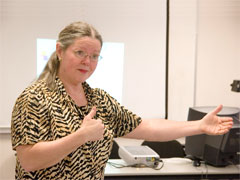Qualified
By Jim Oldfield
. . . in the support groups, women would say they were tired from their radiation. They'd go home and nap. And I'm thinking, you know, it's just not an option for a Mum, a Mum with young children. You have to be up! You have to be on!
—Young breast cancer survivor
Support services designed exclusively for older patients. Fear of treatment-induced menopause. A sense of loss as responsibilities are taken over by others. These are just a few of the concerns Sunnybrook Research Institute (SRI) associate scientist Dr. Margaret Fitch and her colleagues uncovered in their examination of young women's experiences with breast cancer.
The study, based on in-depth interviews with 28 breast cancer survivors aged under 45 years, and published in the Canadian Oncology Nursing Journal in 2008, illustrates the nature of an underappreciated but powerful research method: qualitative analysis. The method doesn't involve numbers and measurements, but rather narrative data collected from study participants through interviews, focus groups and other subjective interactions. Able to produce starkly clear and actionable results—identifying, for example, the need to offer young women cancer services at hours compatible with their work and family schedules—qualitative studies can also capture something intangible: individual experience.
"Partly," said Fitch, while leading a recent seminar on qualitative analysis for nurses and health professionals in Sunnybrook's practice-based research seminar series, "this research is about entering [another person's] space without saying, 'You're different from me,' or 'I don't like the way you're doing that,' but rather, 'I want to learn, engage fully and understand why your experience is as it is.'"
The interpretation of the young women's breast cancer study—based on hours of conversations meticulously transcribed verbatim, then coded, classified and distilled to singular ideas—produced three overarching themes: "everything depends on acting now;" "everything is out of sync;" and "cancer invaded my whole life."
"The emotion generated through those conversations," said Fitch to the group, many of who were there to gain research-oriented knowledge or learn techniques to study care improvements, "was qualitatively different than some of the interviews we'd done with older women. The passion that emerged was palpable, and we subsequently incorporated that into our interpretation."
The main challenge in qualitative approaches, as Fitch outlined in an interview, is remaining impartial. "As the investigator I want to be the tool to bring forth a story, but I want that story to be true to the teller. So I have to be careful I don't presuppose, prejudge or 'know' what I'm going to hear ahead of time." Otherwise, said Fitch, the result may be a skewed reflection of the researcher's perspective rather than an accurate rendering of what the participant said and experienced.
A further challenge lies in achieving acceptance for qualitative studies in the "numbers-heavy" world of medical science. Qualitative research, said Fitch, also an associate professor at the University of Toronto who teaches and practises a variety of research methods, hasn't had the same exposure as quantitative or measurement-based studies—largely because the roots of medical science are hypotheses and numbers. While qualitative methods have been accepted for years in anthropology and sociology, medical researchers in health services, said Fitch, "haven't been asking the questions that would demand qualitative work as long as we've been asking some of the [quantitative] questions."
That appears to be changing, however. At Sunnybrook, growing interest in the practice-based research series suggests both paradigms are seen as important. Fitch is ambivalent but optimistic. "There are still some challenges in sharing this type of research, in having it accepted, but if I look back 15 years, there's a remarkable difference now. I'm encouraged by the growing openness."



